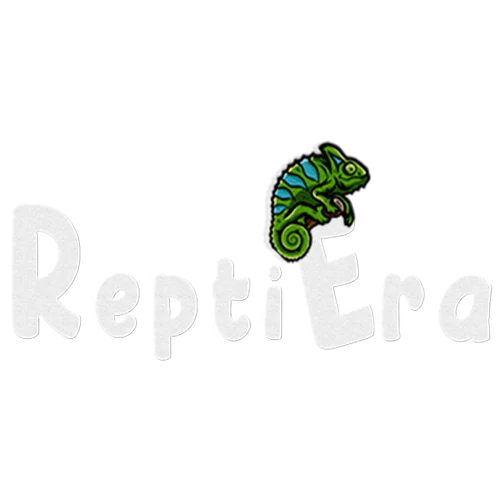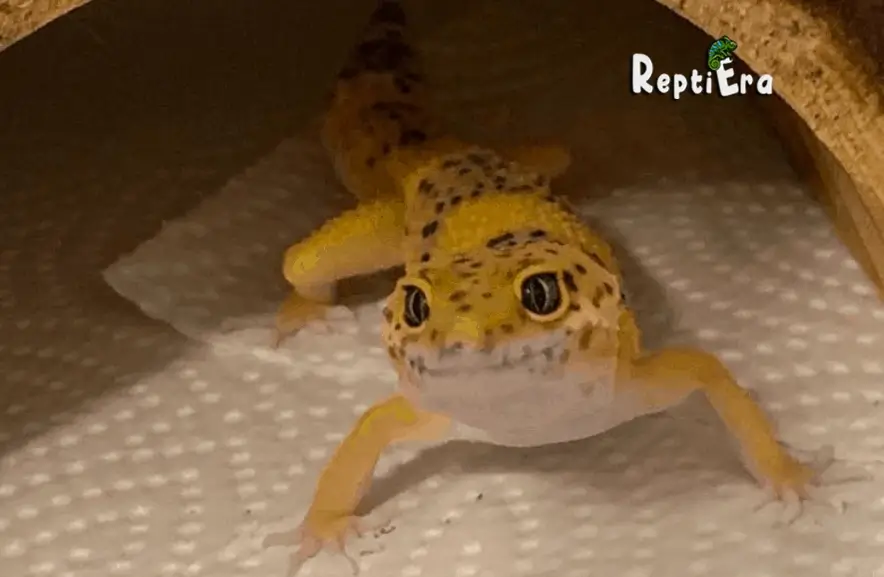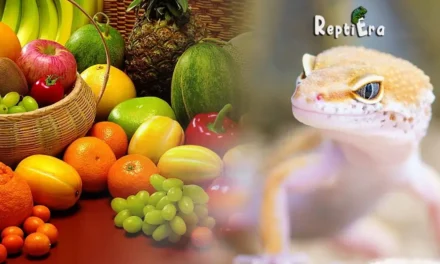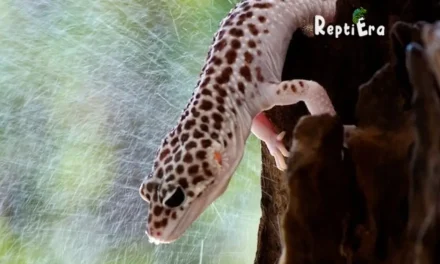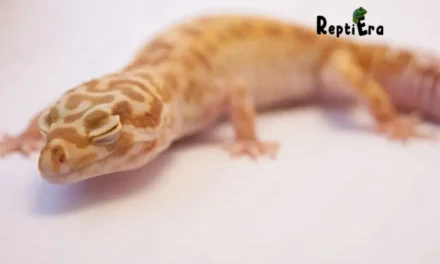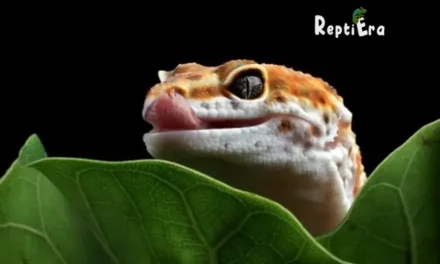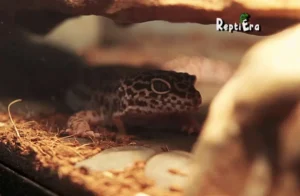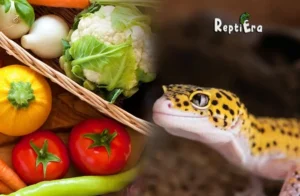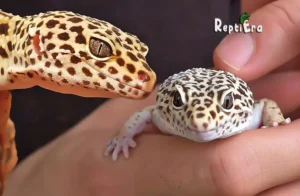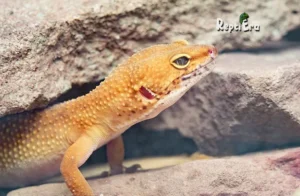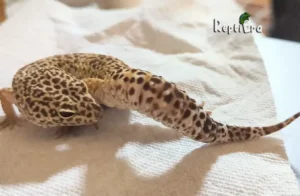Leopard geckos, with their adorable little faces and friendly disposition, have become incredibly popular pets among both new reptile owners and seasoned enthusiasts. Known for their ease of care, these beloved reptile keepers captivate people of all ages and experience levels. As a keeper myself, I’ve spent countless hours observing the interesting behaviours of these Leos. They are fun to watch, whether they’re stealthily hunting crickets, exploring their enclosure, or simply sitting and staring.
Why Does My Leopard Gecko Stare At Me?
This staring habit of these cute critters can provide hours of entertainment and intrigue. Often, it’s their curious nature that prompts them to look at us. They might see their owners as a potential predator or associate them with expecting food. Their focus could be on the movement or even the attention they receive.
Sometimes, it’s something as mundane as the reflection in your shoes that catches their eye. As reptile keepers, we must be mindful of their perception of predators and their overall safety. Understanding this normal behaviour helps deepen the bond with our scaly companion, fostering a better understanding of each Leopard gecko and its unique personality.
Table of Contents
Reason 1: A Totally Normal Behavior
Whether you’re on your phone, watching TV, or just looking over and noticing your gecko staring at you, only to look up a few minutes later and find them still gazing away, there’s usually nothing wrong. It’s unlikely they are not feeling well; rather, this is totally normal behaviour for leopard geckos. You can rest assured that they will eventually break their gaze.
It can be quite fun to walk around the room and see how your reptile follows your steps, or even to hold a finger near them and move it around to see if they’ll look longer. It’s OK to let them do this. As owners, we often find this behavior endearing and cute, rather than something to be afraid of. Just accept it as part of their personality, with a safety precaution to not misinterpret it as a sign of distress.
Reason 2: Your Leopard Gecko Is Curious About You
If you’ve just gotten a leopard gecko and noticed your new little friend staring at you, don’t fret. They’re not silently judging you; instead, they’re trying to make sense of who you are and what you represent in their world. Leos are naturally curious reptiles, highly observant of their surroundings. They constantly identify changes in their environment, a trait crucial for their survival.
This behaviour is well-documented; a study published in Behavioral Processes saw researchers exploring this aspect. They placed objects in gecko enclosures and noted how these creatures reacted when a familiar object was replaced with a new one, or when the original objects were moved to a different spot in the enclosure. In each situation, the geckos spent more time near and investigating these changes.
This curiosity isn’t just a random act. These geckos showed they could differentiate between old objects and new ones. The researchers found that the geckos stared significantly longer at new items, indicating a keen ability to understand and process their surroundings.
So, when your leopard gecko is staring at you, it’s part of their natural instinct to study and become accustomed to their environment. Whether it’s you, a new toy, or a shift in their habitat, they are always keen to understand what’s happening around them.
Also Read: WHY IS MY LEOPARD GECKO ALWAYS HIDING
Reason 3: Your Leopard Gecko Is Scared Of You
Another reason your leopard gecko may be staring is a lack of trust, especially if it hasn’t spent much time with humans and might think of you as a predator. This cautious behaviour is their way of trying to keep an eye on what they perceive as a potential threat.
If you approach too quickly, it can be a sign they are feeling apprehensive or fearful. Other signs that your gecko is uncomfortable include hiding, waving their tail, or even making small noises. If your pet exhibits these behaviours, it’s a clear indication they don’t yet feel safe. To help them become more comfortable, try approaching slowly, offering treats, and gently handling them.
Allowing your gecko to get used to your presence by spending time near their enclosure can be a gradual process, but it’s essential to remember that they’re not naturally social animals and adjusting to human interaction takes time.
Gradually fostering trust with your leopard gecko through various methods:
- Regularly and gently interacting with your gecko, ensuring not to overwhelm them – find a balance that suits their comfort level.
- Consistently being in proximity to your gecko to familiarize them with your presence, perhaps engaging in activities in the same room as their habitat.
- Maintaining a serene demeanour in the presence of your reptile to avoid causing them anxiety or stress.
Reason 4: Your Leopard Gecko Is Hungry
When your leopard gecko stares intently as you approach their enclosure, it might be because they’re super hungry. Imagine them dreaming of a juicy bite as they stare, picturing food in their mind.
This behaviour can be a form of classical conditioning, where they associate your presence with the arrival of delicious goodies. Just like the famous experiments by the Russian psychologist Pavlov with dogs, your gecko might have conditioned themselves to respond to stimuli – in this case, you – as a signal of incoming food. It’s a unique connection between keeper and pet, where they see you not just as their owner, but as their food provider.
You might even notice them preemptively lick their lips or ask with their eyes when they’re hungry, a common behaviour seen in many pets. However, be cautious not to overfeed them. A starving look doesn’t always mean they’re hungry; sometimes, they might just be expecting food as a conditioned response, especially if you have a routine of giving them food every time you come home from work.
Feeding them too much can lead to them becoming an adorable chunk, but remember, overweight or obese geckos face health risks like heart, liver, and joint problems. If you’re unsure about their diet or notice drastic changes in their weight, it’s always wise to consult a veterinarian. Balancing their diet is crucial for their health and longevity, ensuring they remain the adorable and healthy companions we love.
Reason 5: Leopard Geckos Are Attracted To Movement
As you walk into the room, your leopard gecko often whips their head around to stare. This is because, as curious critters, their tiny piercing gaze follows each step you take, almost like you’re being stalked.
This behaviour is rooted in their natural instincts; movement grabs their attention. In the wild, they are attracted to movement as an adaptation for consuming living prey over dead, bacteria-ridden ones. When you dump a meal of crickets into their vivarium, you’ll notice they often bypass the unmoving bugs, locking their sights on a living cricket to kill and consume.
This instinctual preference helps them avoid disease-causing organisms that often come with deceased insects, which lack nutritional value and moisture content. The possibility of disease and the lack of nutrition in dead insects make them a less desirable choice. So, when your gecko stares at you moving, it’s a sign of their healthy, natural behaviour, not just a quirk – they’re hardwired to respond to and feed on movement, ensuring their survival and well-being.
Also Read: HOW TO TRAVEL WITH A LEOPARD GECKO
Reason 6: Your Leopard Gecko Is Actually Staring At Their Reflection.
Sometimes, when it looks like your leopard gecko is staring at you, they might be fascinated by their reflection. Research suggests that some gecko species can recognize themselves to some extent, not by sight, but by scent. When they see a mirror, their initial thought isn’t self-recognition but rather the perception of seeing an entirely different gecko.
They might try to determine if this new lizard is a potential mate or a rival. It’s a moment of learning, where they’re taught a lesson about their environment. While they might not be cognitively advanced enough to understand mirrors as humans do, their reaction to their reflection is a fascinating glimpse into their behaviour and cognitive abilities.
Reason 7: They Have Sharp Eyes
Your small leopard gecko has pretty good eyesight, a trait vital for a prey animal. They’ve developed a sharp sense for moving objects, whether it’s large or small, as a way to identify food and assess dangers in their environment. In their natural habitat, they prefer live food over dead food, making them more inclined to bother with things that move. Leos often won’t even consider dead insects as food, but they are fortunate enough to be ferocious predators when it comes to crickets, mealworms, and other insects.
These critters in the wild are always on their menu, thanks to their sharp eye for detail. This keen vision also helps them stay wary of their surroundings, especially of creatures larger than themselves for safety. They can see in colour and have excellent night vision, enabling them to distinguish between different species of snakes, mammals, and birds that might pose a threat.
Research has shown that Adult geckos, when stared at, can encounter a snake and react differently compared to a juvenile with less experience. This inexperience leads them to react the same way, regardless of the snake species. It highlights how their sharp eyes play a crucial role in their survival, helping them identify a potential predator and stare to better understand and evaluate the threat.
This instinctive behaviour is a fascinating aspect of their interaction with their environment, demonstrating their capability to learn and adapt.
Reason 8: Pleading for attention
Should you not devote ample time to your leopard gecko, they might fix their gaze upon you in an attempt to capture your notice. It could even appear as if they are imploringly appealing to you through their gaze.
What are other behaviours common among leopard geckos?
Beyond staring, leopard geckos exhibit a variety of other unusual behaviours that are typical for the species. These encompass:
- Flicking of the tongue: Leopard geckos use this behaviour to explore and become acquainted with their surroundings. They possess a Jacobson’s organ at the tip of their tongues, aiding in olfactory perception.
- Making unusual sounds: These sounds, including chirps, squeaks, and screams, might signal that the gecko is experiencing discomfort or feeling threatened.
- Tail wagging: This action is a form of communication among leopard geckos, with variations in wagging speed conveying different messages.
- Habitual hiding: While it’s normal for leopard geckos to seek refuge briefly during the day, prolonged and continuous hiding could be a cause for concern.
Why does your leopard gecko stare at other objects and animals?
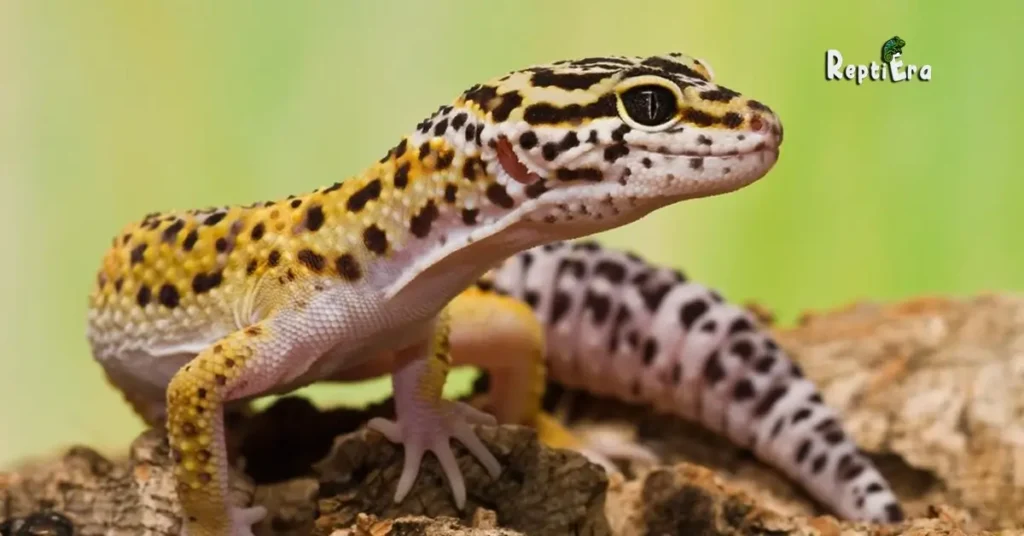
Although your leopard gecko may fix their gaze on other animals and items for similar motives as they do with you, there are additional factors to consider. These reasons encompass:
Territorial behaviour
When you introduce another animal to your leopard gecko’s tank, you might notice them staring more. This starting is an effective way for them to protect their territory. They’re deciding whether to fight or accept the new animal as part of their environment.
Enigma syndrome
Enigma Syndrome (ES), a prevalent neurological condition among leopard geckos, adversely impacts their equilibrium and cognitive abilities, leading to symptoms such as:
- Extended periods of upward gazing, known as stargazing, where the gecko stares at the ceiling
- Continuous circling behaviour
- Tilting of the head
- Refusal to eat
- Difficulties in capturing prey
- Performing a death roll manoeuvre
If you notice more than one unusual symptom in your leopard gecko, such as persistent staring, it might be wise to get your gecko to a vet. They are the only ones who can accurately diagnose a disease like Enigma syndrome. Keep in mind, that there’s no cure for this condition, but it can be managed by removing stressors from your leopard gecko’s life.
This might include reducing excessive handling, removing tankmates, or ensuring you don’t change their environment too often. In cases where they’re severely affected, you might even need to hand-feed them for the rest of its life to ensure their well-being.
Should You Be Worried If Your Leopard Gecko Is Staring At You?
Staring is a normal behaviour for leopard geckos, and it may appear for no specific reason other than their responding to their environment or something outside their enclosure. It’s a sign of a healthy and alert animal, so there’s generally no cause for alarm. It’s important to note that, like members of any species, each gecko has its personality.
Some might be more inclined to stare than others, and that’s okay. As long as your gecko exhibits other signs of health, like a good appetite, being active at appropriate times of the day, maintaining healthy colouration and clear eyes, and regulating their temperature by moving to different parts of the enclosure, there’s usually nothing to worry about. Their staring is just a part of their curious and observant nature.
Also Read: WHY IS MY LEOPARD GECKO LICKING HIS BUM
Your Gecko Probably Isn’t Staring At You Because They Are Angry
While in some animals, like cats, a prolonged, unblinking stare can be a sign of agitation or aggression, leopard geckos tend to express their wrath differently. An aggressive Leo is more likely to wag its tail, rush at you with its mouth open, or make a wide variety of vocalizations, including hissing, chirping, and even a noise that resembles a bark.
As a last resort, they might bite with their tiny jaws, but this rarely causes significant damage to humans. It’s more about them displaying signs of discomfort or fear. If your gecko is showing these signs, it’s best to give them time to cool off before attempting to handle them. Upset geckos can experience unnecessary stress, and in extreme cases, they might even resort to dropping their tail – a defence mechanism.
So, if your gecko stares at you, it’s unlikely due to anger, but understanding their behaviour helps in creating a stress-free environment for them.
My Gecko NEVER Stares! Is Something Wrong?
Not at all. Just like every other animal, Leopard geckos have their mannerisms and personalities. While these reptile-brained creatures often stare at their owners, it’s perfectly OK if yours never does. This is just ordinary behaviour for them. Being an exception rather than the rule is no cause for worry.
Note: If your gecko never stares but is well cared for with a clean cage, plenty of food, accurate temps, and enriching activities, they are likely doing just fine. The bottom line is, that new gecko owners shouldn’t fret if their little fellow doesn’t stare. It doesn’t mean they aren’t comfortable; they might just not feel the need to do so, which is a normal variation in their behaviour.
Do Other Reptiles Stare?
If you’re reading this as someone interested in Leo behaviour but never owned one, or if you’re a herpetology junkie considering adopting another reptile in the future, you might wonder if this staring is unique to leopard geckos. The answer is, not exactly. If you own or have owned a reptile, whether it’s a bearded dragon, an iguana, or a crested gecko, you might have spotted similar behaviour.
It’s true that other reptiles also exhibit this staring, but the reasons might differ. Like Leos, they might be keeping tabs on moving objects, establishing trust, or learning to watch out for potential threats. This behaviour can be chalked up to their instinctual nature, making it a fascinating aspect to observe whether you’re a seasoned owner or thinking of getting into the world of reptiles.
FAQs
Do Other Reptiles Stare? Which Ones?
Yes, several reptiles, especially lizard species, are known to stare when they are interested or assessing security and food. A common house lizard, for instance, might stare when threatened or curious about its surroundings. Lizards often view humans as potential predators, so they watch closely to ensure they’re safe from human movement, much like how they’d observe other potential threats or pets like dogs and cats.
Do Leopard Geckos Bond With Their Owners?
While a Leopard Gecko doesn’t show emotions like mammals, they can still bond with their owners through handling, petting, feeding, and taking them outside their cage for enrichment activities. These interactions help form a good bond. However, it’s important to note that Geckos don’t naturally bond with a tribe like some animals, and it’s discouraged to co-habit them for breeding, to avoid stress. Therefore, keeping two in the same tank or cage is generally not recommended.
Why Is My Leopard Gecko Rubbing/ Licking Its Eye?
Apart from staring, you might notice your Leopard gecko licking or rubbing its eyes. Unlike humans, Geckos can’t blink or produce tears for moisture. This licking behaviour is their way of maintaining eye health. If you see your pet Leo doing this often, it’s normal behaviour and usually nothing to worry about.
How do you know if your leopard gecko trusts you?
Observing a leopard gecko can be fascinating, especially when it sees you and approaches the front glass of its tank. This behaviour shows trust and curiosity. Their movements are effortless and smooth, a sign of comfort in their environment. When touched, a trusting gecko typically reacts calmly, indicating a strong bond with its owner. Interestingly, their behaviour changes when they’re hungry, becoming more active inside and outside their usual resting spots.
How do I know if my leopard gecko is happy?
- Explores enclosure happily.
- Glides around with ease.
- Responds to being touched.
- Comes to the enclosure’s front when approached with food.
- Tongue flicking (sensing environment).
- Relishes lounging in the enclosure’s warm area.
Does my leopard gecko recognize me?
Leopard geckos, with their keen sense of smell, can surprisingly identify their owners. In some cases, even docile geckos have shown unexpected reactions, like biting, when encountering new types of cologne or deodorant. This reaction is not out of aggression but rather a defensive response to an unfamiliar smell.
Why does my leopard gecko lick me?
When your gecko licks you, it’s akin to a dog greeting its owner or a snake using its tongue to smell. This behaviour is not just a simple gesture; it’s their way of using their tongues to explore their surroundings. If you poke their nose or mouth, they might lick you more, as if to think, “Whoa, suddenly something’s in front of me!”
Conclusion
As a proud leopard gecko owner, I’ve often wondered why my pet seems to stare at me with such intensity. Initially, it caused me some worry, but I soon realized that this is a normal part of their behaviour. Leopard geckos are naturally curious reptiles, always keen to figure out their surroundings and the people in them. This staring is not just a habit; it’s their way of taking in information. When my Leo gazes into my eyes, I understand it’s trying to understand who I am and what I’m doing.
Sometimes, it’s a sign they’re expecting food, but often, it’s just them being their inquisitive selves. The variety in their behaviours can tell a lot about their health too. Noticing a change in how much they stare can be an indicator of whether they are healthy or if something might be off. During these moments of staring deep, I can’t help but feel a special connection with my scaly friend. It’s also the perfect opportunity to snap some cute pictures. Each gecko has its unique way of interacting, and understanding this can be incredibly rewarding. So, next time your leopard gecko fixes its gaze on you, just enjoy the moment. It’s their way of saying they’re comfortable in your presence.
